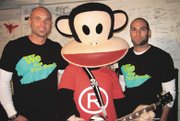Paul Frank Acquired by Los Angeles Investment Group
Julius the monkey is getting a new lease on life.
Los Angeles–based Saban Brands acquired Costa Mesa, Calif.–based Paul Frank Industries on Aug. 17 for an undisclosed price.
The acquisition includes all of Paul Frank’s assets and intellectual property, including Julius the monkey and more than 150 characters that populate the brand’s apparel, accessories and other offerings.
This is the second acquisition for Saban Brands, formed this year with $500 million in capital to manage and license entertainment properties and consumer brands.
Saban, a subsidiary of Saban Capital Group Inc., headed by Los Angeles billionaire Haim Saban, will be responsible for managing Paul Frank’s future business strategy. Elie Dekel, president of Saban Brands, will be Paul Frank’s new chief executive. Creative operations will continue to be run from Paul Frank’s headquarters in Orange County, Calif., under the direction of Ryan Heuser, the company’s co-founder, who will remain as chief creative officer. John Oswald, co-founder and Paul Frank’s chief executive officer, will leave the company after helping Paul Frank settle into its new corporate structure.
Mossimo Giannulli, who had a major interest in Paul Frank Industries and guided the company into its current licensing-heavy business model, will continue to advise and support the company on a strategic level, a statement from the company said. Giannulli joined Paul Frank in 2007 after co-founder Paul Frank Sunich left the company.
The acquisition should have a minimal effect on the staff and operations of the Paul Frank staff operating out of its headquarters, Heuser said in an interview shortly after the acquisition was announced. “Saban is purchasing our creative juices—our creative staff. There is no ambition to close shop and move to Century City [the Los Angeles neighborhood where Saban has its headquarters]. Essentially, there will be no change in staff.”
Heuser said the change in ownership won’t affect current licensing agreements.
Growth is the name of the game for Paul Frank, which earned fans with its kitchy T-shirts, offbeat approach to fashion and parade of cute characters. Dekel sees Paul Frank growing into a myriad of new categories.
“IPhone apps, interactive games, virtual worlds, holiday TV specials, feature films—all of these things are within our scope and available to the Paul Frank brand,” Dekel said. However, the primary focus is growing the business Paul Frank already has.
“Our goal is to first provide more comprehensive support to [licensed] categories that are active. We want to grow the fan base of Paul Frank and grow in volume before we grow in divisions,” Dekel said.
Overseas growth and potential new licensing agreements are big targets for upcoming seasons. Saban Brands will address both when it showcases its new acquisition at the Brand Licensing Europe show in London in September. “We’re going there to reinforce the brand and begin to introduce Paul Frank to the broader market as an emerging opportunity for the European market,” Dekel said. Good fits for new licenses, both domestically and abroad, are crafting supplies, greeting cards, diaries and calendars, he said.
Retail is another avenue of growth. Paul Frank currently operates two corporate retail stores and approximately 30 Paul Frank stores operate under licenses internationally. Saban hopes to grow the number of Paul Frank retail stores and expand on the number of boutique, specialty and mid-tier retailers that sell the brand.
“We will be very selective about how far we stretch this brand. We have a long-term strategy, and we’ll resist the temptation to go too broad and too mass [market] with Paul Frank. The focus will be on maintaining our authenticity and brand integrity,” Dekel said.
In May, Saban Brands paid $100 million to buy back “Mighty Morphin Power Rangers” from Walt Disney Co., which had acquired it from Haim Saban in 2001. “Power Rangers” was Saban Brands’ first acquisition.
Haim Saban has been a major force in the entertainment business. He was a writer of songs for children’s TV shows when he made his first fortune in the 1990s by adapting a campy Japanese TV series for the U.S. market. It was called “Mighty Morphin Power Rangers.” Disney acquired the rights to that TV show as part of a $2.9 billion purchase of Fox Family Worldwide, co-owned by Saban and News Corp.
Saban’s media empire now includes control of the Spanish-language broadcast network Univision.—Erin Barajas






















